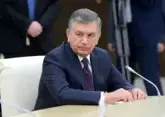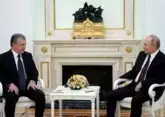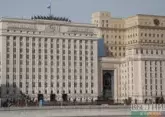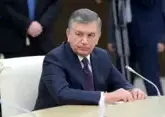On January 5, the second round of voting in elections to the Oliy Majlis, the legislative chamber of the Uzbek parliament, and local councils (kengash) will be held in Uzbekistan. Results based on voting in 128 out of 150 districts showed that no party was able to get more than 50% of the votes. Candidates were nominated by parties, but the elections were held on a majority basis, that is, voters voted for specific people. The 30% quota for women in political parties' lists of candidates, as well as a noticeable rejuvenation of candidates for deputy mandates, are among novelties.
These were the first parliamentary elections after President Shavkat Mirziyoyev came to power. The voter turnout was 67.8%, chairman of the central election commission Mirza-Ulugbek Abdusalomov said. All political parties registered in Uzbekistan participated in the elections. As expected, the Liberal Democratic Party of Uzbekistan won the most seats. Back in September 2016, it nominated Shavkat Mirziyoyev as president. The Milliy Tiklanish (National Revival) party was second, the Adolat (Justice) Social Democratic Party and the People’s Democratic Party - third and fourth, they were followed by the Ecological Party of Uzbekistan.
The election campaign, with first live TV debates, was held under the slogan 'New Uzbekistan - New Elections', and the voting - in the context of the updated election law and the new election code. Numerous international observers confirm that President Mirziyoyev's promises to liberalize the domestic political atmosphere meet the actions. For example, much freer than in previous years media, as well as the emergence of bloggers who freely, without the slightest problem, express their views on certain events in Uzbekistan, including the parliamentary elections. In particular, speaking at a gala meeting meeting on the occasion of the 27th anniversary of the Constitution, the head of state thanked the media and bloggers for an open discussion of the problems: “Many things are open in Uzbekistan now, everyone sees it. They used to be closed. However, you should know that this openness is unstoppable now. I will only be grateful to the media if they will raise more social problems concerning people."
The Economist magazine named Uzbekistan the country of the year. Positive changes began after Mirziyoyev began reforms "that have accelerated over the past year." In particular, the government largely ended forced labor, allowed foreign journalists and representatives of international human rights organizations to enter the coubtry, opened border crossings with neighboring countries. The notoriously famous Jaslyk prison was shut down. "Foreign technocrats have been invited to help overhaul the state-stifled economy," the publication notes. According to The Economist, Uzbekistan still has a long way to go, but "no other country travelled as far" in 2019.
However, along with the positive changes, the discontent of low-income citizens is growing, as economic liberalization has caused strong inflation. Prices of not only consumer goods are increasing, but also of housing services. Tashkent and many cities have turned into one large construction site. Old quarters of cities (mahallas) disappear, and with them the traditional way of life. Mahalla is not only the old quarter of the city, but also a community where people live as one big friendly family. It is noteworthy that the mahalla system is peculiar only to Uzbekistan, it has no analogues in any other country in the world.
The breakdown of the traditional system of life leads to protests. The authorities have so far managed to keep the situation under control, since a large construction site gives citizens new jobs. For the first time, the number of labor immigrants began to decrease. Rural youth prefers Tashkent to Moscow. According to director of the Center for Research Initiatives 'Ma'no' Bakhtiyor Ergashev, taking into account economic reforms, business development and the implementation of industrial policies aimed at creating new jobs and sustainable sources of income, the relevance of the labor migration issue will significantly decrease for Uzbekistan by 2030-2035.
Another evidence of liberalization is that live TV debates between candidates, which were broadcast both on state and private channels. The participants freely expressed their opinions on various pressing issues, including Uzbekistan's possible entry to the Eurasian Economic Union (EEU). The entry into this alliance has become the most relevant topic for both the authorities and residents of the country. There's a long way to reach some kind of common opinion or majority opinion. Part of the society believes that joining the EEU will turn out to be a blessing for Uzbekistan, which will gain access to all the advantages of the alliance. Others fear that the country, without receiving any special benefits, will lose the opportunity to sell its products, because it may not meet the organization’s standards, while now its exports are based on bilateral agreements. In any case, the idea of joining the EEU does not cause the previous categorical rejection.
Bakhtiyor Ergashev emphasized the importance of conducting economic reforms in the first place, then political ones. The current election fits into this track. "At this stage, it is important to understand what are the parliamentary reform priorities and how the executive will act with the legislative. For example, it is legislatively stipulated that only political parties can participate in elections in Uzbekistan. Therefore, the Ecological Movement, which was previously guaranteed 15 seats in parliament, was transformed into a party. But at the same time, the government doesn't allow self-nominated candidates anymore. This is natural: they have political parties, systemic institutions with which the state has learned to work. The fact that they were made the only major actors of the election campaign is a normal technological solution," Ergashev believes.
The political scientist believes that another achievement of the past elections is the fact that the authorities managed to suppress the "temptation of big changes," to allow cardinal transformations of the electoral law and the mechanisms of the election campaign and agitation. “It can be stated that a new stage of development has begun in Uzbekistan in 2016-2017, which is characterized by really big changes in the political, economic and social spheres. The country has been undergoing reforms. And the most dangerous part of this is when the population does not see the results of the reforms, but feels their painfulness, without which reforms impossible. At this time, political experiments are fraught, as it is important to maintain control over the process of political and economic reforms, which, by the way, was not done in the USSR during the perestroika period,” the expert noted.
This explains the fact that the opposition parties that conduct their activities abroad are still out of the game. According to Ergashev, this is also justified, because "these parties have long been removed from realities in Uzbekistan and it is not clear what constructive proposals they can make." “Letting them into the political process is tantamount to letting them begin to undermine the situation. The authorities, of course, couldn’t do that,” Ergashev said.
But we shouldn't expect serious dissatisfaction with the election results, any protests. A bad result is a consequence of the party's poor work with the electorate. Many citizens admitted that they did not know the candidates and their programs, and therefore did cast their votes. And according to the most conservative estimates, it can be applied to every fourth voter in the republic.
The election participants will not argue with such an explanation, because today there no people in Uzbekistan who do not understand the weaknesses of political parties, and, as a result, the parliament. Throughout the years, according to Ergashev, the parliament, which should be involved in lawmaking, basically just approved the laws developed by the government. "Uzbekistan de jure has the government of the parliamentary majority. According to the Constitution, Uzbekistan is a parliamentary-presidential republic. But in fact it has the super-presidential system of government. The task of the authorities is bringing the system in line with the Constitution, that is, increasing the role of the parliament," Ergashev said.
On January 5, the second round of voting will be held at 22 polling stations, because no party was able to get the required number of votes. Six more candidates withdrew from the race before the start of voting. Uzbekistan remains a presidential republic, but such changes testify to the authorities’s readiness to play along with strengthening the parliament's role. The political party that will win the most votes is entitled to submit its candidate for Prime Minister.
This election is a warm-up before the 2025 parliamentary elections. By this time, the issue of whether the society and the country need small parties in their current form will be on the agenda. "The process of structuring the political framework has not yet been completed. It is underway and serious conclusions will be made on the small parties in parliament, which have no more than 10% of MPs. There is a request in society for an increasingly intensifying process of forming a market economy. If there is a surplus of labor, entrepreneurs have the opportunity to suck out all the juice from the workers and not to comply with the minimum requirements of the law. Therefore, there is a request for the formation of a strong Social Democratic Party, which would be able to defend the interests of employees. There is a request for a liberal idea in society, and I think it is quite possible that a new liberal party will be able to take away the votes from the Liberal Democratic Party of Uzbekistan and operate in terms of liberal ideas. At the same time, Uzbekistan, a country with the population having very traditional views, has no party really defending conservative traditional values," Ergashev noted. In his opinion, it's just the beginning.










